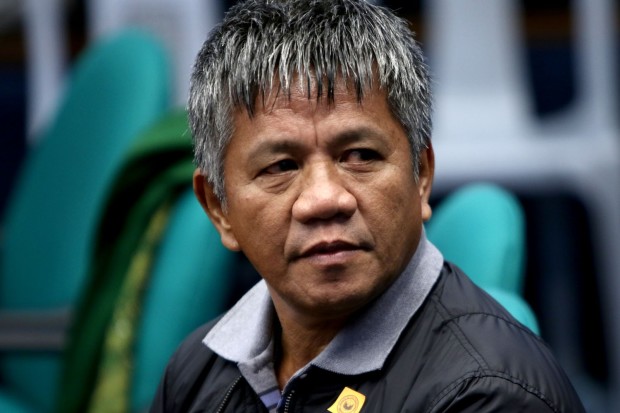Hit man’s raps trigger calls for Duterte probe

Witness Edgar Matobato during the Senate probe on the alleged extrajudicial killings at the Senate in Pasay City.
INQUIRER PHOTO / RICHARD A. REYES
The Philippines yesterday faced calls to investigate President Duterte after a confessed hit man alleged that he ordered a thousand suspected criminals and opponents murdered when he was still mayor of Davao City.
Edgar Matobato, 57, told a Senate inquiry on Thursday that he and other members of the so-called Davao Death Squad killed some 1,000 people in Davao City on Mr. Duterte’s orders from 1988 to 2013, with Mr. Duterte himself shooting dead one of the victims.
“These are serious allegations and we take them seriously, we look into them,” said Mark Toner, deputy spokesperson for the US state department.
Critics say the alleged killings in Davao, where Mr. Duterte was mayor for more than 20 years, established a pattern that has spread nationwide under the new presidency.
The allegations surfaced as the Senate committee on justice and human rights investigated alleged extrajudicial killings in Mr. Duterte’s brutal war on drugs, which has taken more than 3,000 lives since he launched the crackdown upon taking office on June 30.
The testimony of Matobato sheds light on “the similarity of the strategy adopted by the [Davao Death Squad] and that of the vigilantes that now roam the whole country,” Sen. Leila de Lima, the committee chair, said in a statement.
Matobato said Mr. Duterte also ordered the death squad to kill De Lima, when she chaired the Commission on Human Rights and was investigating the mayor’s possible role in the extrajudicial killings in Davao in 2009.
UN investigators
He said he and others from the squad were waiting to ambush De Lima but she did not go to a part of a hilly area to inspect a suspected mass grave where they were waiting to open fire.
“If you went inside the upper portion, we were already in ambush position,” Matobato told De Lima. “It’s good that you left.”
US-based watchdog Human Rights Watch (HRW) urged the Philippines to let United Nations investigators probe Matobato’s claims.
“President Duterte can’t be expected to investigate himself, so it is crucial that the United Nations is called in to lead such an effort,” the monitor’s Asia director, Brad Adams, said.
In 2009, HRW published a report detailing the involvement of police and local government officials in Davao Death Squad killings during Mr. Duterte’s long rule as mayor of the city.
Sitting Philippine presidents are immune from criminal prosecution during their single, six-year term.
But the Constitution provides for their impeachment and removal from office for “culpable violation of the Constitution, treason, bribery, graft and corruption, other high crimes, or betrayal of public trust.”
In 2001, President Joseph Estrada was removed from office in a military-backed popular revolt, though an impeachment trial against him on graft charges was inconclusive.
Davao-style rule
During his campaign for Malacañang, Mr. Duterte promised to roll out on a national scale the mailed-fist style of government that he used to make Davao City a safe place to live.
He promised to kill tens of thousands of criminals to wipe out crime and rid the country of illegal drugs within six months of his presidency.
After winning the election, he exhorted police to shoot to kill drug suspects who would resist arrest, promising them bounties and protection from prosecution.
He also urged armed citizens to kill drug suspects who would resist arrest in their communities, promising them medals.
Mr. Duterte has denied involvement with the Davao Death Squad, but Matobato told Thursday’s Senate inquiry that he and other members of the liquidation squad took orders from him and killed about 1,000 suspected criminals and opponents of Mr. Duterte and his family.
Matobato admitted to carrying out about 50 of the abductions and deadly assaults, including the attack on a suspected kidnapper who was fed alive to a crocodile in 2007.
“Our job was to kill criminals like drug pushers, rapists, snatchers. That’s what we did. We killed people almost every day,” he said.
Failure to charge
Wilnor Papa, a campaign officer for the Manila office of Amnesty International, said rampant killings were the outcome of the failure of previous administrations to bring criminal charges against Mr. Duterte.
“We are now seeing [motorcycle-borne assassins] like those that prowled the Davao streets in the late 1990s. The targets are not only drug syndicates [but even purse snatchers]. [A]nd they can target basically anyone,” Papa told Agence France-Presse.
Philippine human rights officials and advocates have previously said potential witnesses refused to testify against Mr. Duterte when he was still mayor out of fear of being killed. Reports from AFP, AP and Jaymee T. Gamil/TVJ
RELATED STORIES
Dela Rosa denies connection with Matobato